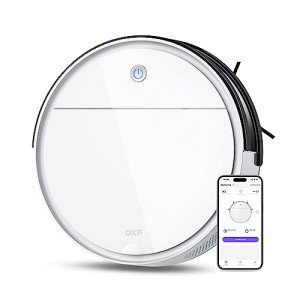15 Terms That Everyone Involved In Robotic Vacuum Industry Should Know
The Rise of the Robotic Vacuum Cleaner: Revolutionizing Home Cleaning
In the world of home appliances, robotic vacuum have become among the most considerable developments recently. These autonomous gadgets use benefit and efficiency, permitting house owners to maintain cleaner living areas without the drudgery of manual vacuuming. This short article explores the development, functionality, benefits, and factors to consider relating to robotic vacuum, in addition to providing insights through data tables and regularly asked questions.
A Brief History of Robotic Vacuum Cleaners
The journey of robotic vacuum cleaners began in the late 20th century, with early models stopping working to make significant strides in homes. However, advancements in technology caused the intro of more refined models in the early 2000s. best robot vacuums UK as iRobot and Neato played a critical function in popularizing these wise home gadgets.
Evolution Timeline of Robotic Vacuum Cleaners
Year
Turning point
1996
Release of the first robotic vacuum, the ELECTROLUX TRINITY
2002
iRobot introduces the Roomba, an extensively acknowledged design
2012
Introduction of designs with innovative mapping abilities
2020
Incorporation of synthetic intelligence for enhanced navigation
2023
Designs with integrated smart home connection and app control
How Robotic Vacuum Cleaners Work
Robotic vacuum cleaners make use of a combination of sensing units, mapping technology, and expert system to navigate and tidy numerous surfaces successfully. Here's a streamlined overview of their core performance:
Sensors: Equipped with infrared or ultrasonic sensors, these gadgets can spot challenges, cliffs, and dirt, allowing them to browse through spaces without crashing into furniture or tumbling down stairs.
Navigation: Most modern-day robotic vacuum incorporate clever mapping technologies, allowing them to draw up the home design and optimize cleaning courses.
Cleaning Mechanism: Using brushes and suction power, robotic vacuums gather dirt, dust, and debris from various floor types, consisting of carpets and wood.
Charging and Cleaning Schedules: After finishing a cleaning session or when their battery runs low, these robotics instantly go back to their charging dock. Users can set cleaning schedules by means of mobile phone apps, helping keep a tidy home effortlessly.
Advantages of Robotic Vacuum Cleaners
Robotic vacuum offer numerous benefits over traditional vacuuming techniques. Here are some of the essential advantages:
- Time-Saving: Automated cleaning means homeowners can allocate their time to other activities.
- Convenience: Scheduling cleaning sessions enables for a clean home without manual intervention.
- Thorough Cleaning: Many robotic models include specialized brushes to deal with pet hair and supply deep cleaning on carpets and carpets.
- Smart Home Integration: Many units are compatible with wise home systems, providing voice control and remote management.
Popular Features in Robotic Vacuum Cleaners
Function
Description
Mapping Technology
Develops a digital map of the cleaning area
Mobile App Control
Supplies users the capability to start/stop or schedule cleaning sessions from another location
Self-Cleaning
Some designs have docking stations that can self-empty dust bins
Advanced Sensors
Spots dirt more efficiently and browses better
Voice Control
Suitable with virtual assistants like Alexa and Google Assistant
Considerations Before Purchasing a Robotic Vacuum Cleaner
While robotic vacuum cleaners provide numerous benefits, possible buyers ought to think about a few factors before buying. Here are some points to keep in mind:
Key Factors to Evaluate
Floor Type: Certain models perform much better on carpets while others stand out on hard floorings. Buyers ought to choose flexible vacuums if they have actually blended flooring.
Battery Life: Longer battery life enables for extended cleaning sessions. Look for robot vacuum cleaner with mop that can cover large areas without frequent recharging.
Dustbin Capacity: A larger dustbin minimizes the frequency of emptying, making cleaning less labor-intensive.
Noise Level: Some designs run silently, which is perfect for homes with infants or sensitive pets.
Maintenance: Users must likewise examine the ease of maintenance, especially for filters and brushes.
Potential Drawbacks
- Rate: Robotic vacuum cleaners can be significantly more pricey than conventional vacuums.
- Effectiveness: While they effectively keep tidiness, they might not always match the deep cleaning effectiveness of manual vacuums.
- Obstacle Navigation: Some models may battle with particular types of furniture or messy areas, potentially causing missed out on areas.
FAQs About Robotic Vacuum Cleaners
Q1: How typically should I run my robotic vacuum cleaner?
A1: It usually depends upon your family. For robot vacuum cleaner UK with animals or high foot traffic, running it everyday is helpful. In less active homes, you might find every other day suffices.
Q2: Can robotic vacuum work on carpets?
A2: Most robotic vacuums can clean up carpets; however, functions such as suction power and brush design can considerably affect their efficiency on various carpet types.
Q3: Are robotic vacuum great for animal hair?
A3: Yes, many designs are particularly designed to get pet hair and feature specialized brushes to avoid tangling.
Q4: What occurs when the vacuum lacks battery?
A4: Most robotic vacuums automatically return to their charging dock when their battery is low, ensuring they are prepared for the next cleaning session.
Q5: Can I control my robotic vacuum with my smartphone?
A5: Yes, many robotic vacuum come geared up with mobile apps that permit you to set up cleanings, monitor development, and get notifications.
Robotic vacuum represent a significant improvement in home-cleaning technology, merging convenience with effectiveness to basically modify how homes preserve tidiness. As innovations continue to emerge, these devices are becoming progressively capable, offering users not just time-saving services but likewise enhanced cleaning experiences. As the marketplace continues to grow, potential buyers are encouraged to weigh the functions, benefits, and factors to consider carefully to find the very best model customized to their distinct requirements. Whether it's a busy family, a pet enthusiast, or someone seeking automation in their cleaning regimen, there's most likely a robotic vacuum cleaner that fits the bill.
